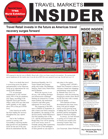 The Caribbean Hotel and Tourism Association (CHTA) is strongly urging Caribbean governments to consider carefully the impact of leveling high air travel-related taxes and fees on travel demand as the struggling island nations wrestle with balancing budgets.
The Caribbean Hotel and Tourism Association (CHTA) is strongly urging Caribbean governments to consider carefully the impact of leveling high air travel-related taxes and fees on travel demand as the struggling island nations wrestle with balancing budgets.
CHTA’s Director General and CEO Frank Comito, speaking last Friday following the International Air Transport Association’s (IATA) Aviation Day conference in Barbados, said that the CHTA recognizes the fiscal challenge facing the Caribbean, but warned that taxes on travel may push tourists to choose other, less expensive destinations.
The conference, which was sponsored by IATA, the Caribbean Development Bank (CDB) and the Latin American and Caribbean Air Transport Association, shared reports from IATA and the CDB that reinforced the importance of policies which can stimulate travel into and within the region.
The CDB and IATA cited high aviation taxes and fees, regulatory barriers and operational deficiencies as obstacles to stimulating more travel, and by extension economic growth. The research clearly points to the reduction in travel demand as costs increase, said Comito.
Not only would the government see fewer tax revenues, but local businesses would likely suffer, Comito contended: “High upfront taxes also typically adversely affect on-island spending by visitors who do come. They will either opt for shorter stays or spend less on activities, restaurants and attractions to offset the additional cost.”
The region saw this happen in 2010 and the immediate years following, he recalled, “as the United Kingdom imposed large duties on travelers to, from and through their country. As the cost of family travel increased by hundreds of dollars, travel demand declined, impacting net tax revenue and employment in those Carib-bean destinations which had a high percentage of UK-based and transient travelers.”
At that time, Barbados successfully led a regional lobby against the air passenger duties and eventually the UK modified the duties, which helped restore travel demand to the region, noted Comito.
While Caribbean tourist arrivals have grown in recent years, the region continues to lose global market share and growth within the region. Travel is currently heavily skewed to less expensive destinations.
CHTA cited data from the World Travel and Tourism Council and the Caribbean Tourism Organization showing an erosion of market share and disproportionate visitor arrivals growth. Likewise, intra-Caribbean travel has declined significantly as the cost of travel within the region has skyrocketed.
Comito represents the region’s largest private sector tourism organization. He suggested that greater awareness of the impact of travel and tourism on local economies was needed at a critical time for the Caribbean.
“We need to incentivize travel on the front end. Taxing outputs has proved to be a more successful strategy than taxing inputs.”









